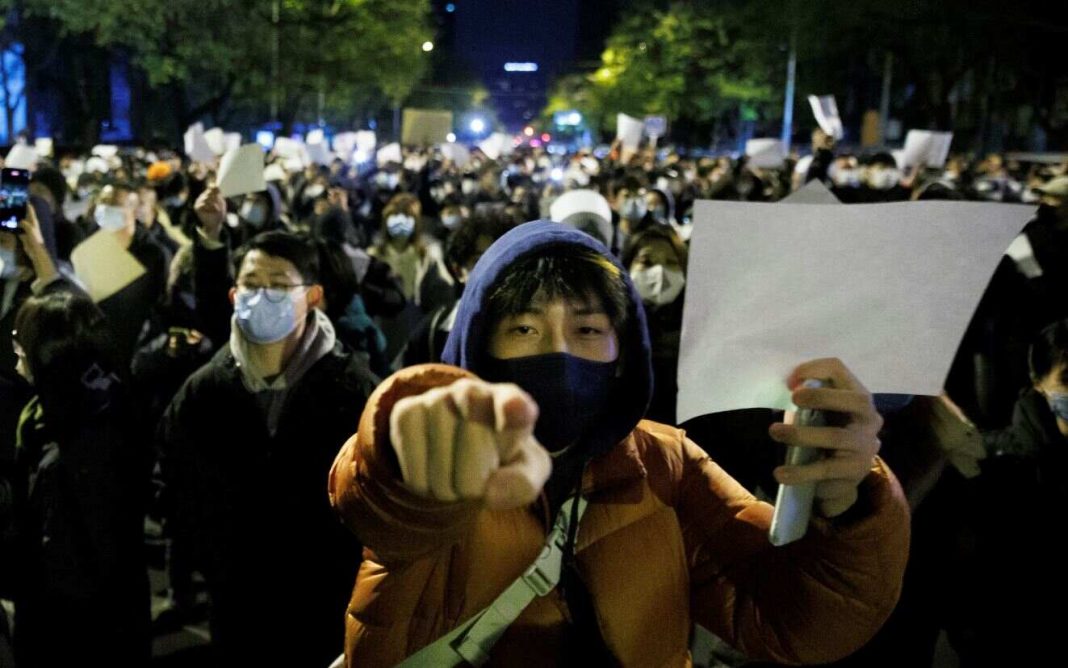A malfunctioning power strip in a bedroom on the 15th floor of an apartment complex in the far west of China was the cause of the fire that broke out there. It took the firefighters three hours to put it out, which was too slow to avoid at least ten fatalities. What might have been an isolated accident and a political issue for local officials became a tragedy and a tragedy that evolved into a political headache.
Even while authorities denied that it had occurred, outraged comments filled social media and citizens rushed to the streets in the city where the fire broke out. Many people had the suspicion that a Covid lockdown had hindered rescue attempts or kept victims inside their houses.
Now, the incident that took place in Urumqi, which serves as the capital of the Xinjiang province, has sparked the most defiant outpouring of public rage against the Communist Party that has taken place in recent years. During the last weekend, hundreds of people gathered in towns all around China to mourn the victims of the fire with candles and flowers. Students held vigils on college campuses, with many of them protesting in silence by holding up pieces of blank white paper.
A few people in Shanghai even went as far as to question the Communist Party and its leader, Xi Jinping, by demanding that they resign from their positions, which is a very uncommon and courageous move.
Barely a month ago, Mr. Xi gained a third term as party boss, solidifying his reputation as China’s most dominating leader in decades. The outpouring has generated new constraints on Mr. Xi, which have arisen only a month after he achieved this goal. His “Zero Covid” plan, which aims to eradicate infections via the use of lockdowns, quarantines, and mass testing, is the primary reason for the widespread outrage.
Although it has significantly reduced the number of people who have died from the coronavirus in China compared to other parts of the world, it has also brought many Chinese cities to a near standstill, disrupted the lives and travel of hundreds of millions of people, and caused many small businesses to fail.
In China, public demonstrations are seldom seen. Particularly under Mr. Xi’s leadership, the party has eradicated the majority of the methods through which citizens might organise themselves to challenge the government. Those who oppose the government have been put behind bars, there is widespread censorship on social media platforms, and independent human rights organisations have been outlawed. Protests that break out in towns and villages sometimes feature workers, farmers, or other residents who are displeased with job losses, land conflicts, pollution, or other concerns that typically do not get publicised.
However, since China’s Covid limitations are so widespread, there is now a focal point for discontent that cuts across social strata and geographic locations. Migrant labourers who are dealing with food shortages and joblessness during weekslong lockdowns, university students who are being kept on campuses, and metropolitan professionals who are being chafed by travel restrictions all have similar sources of annoyance.
In an echo of the events of 1989, when students, workers, small traders, and residents all found some common cause in the protests demanding democratic change that took over Tiananmen Square, the greatest fear of the Communist Party would be realised if these similar grievances led protesters from disparate backgrounds to cooperate. This would be an echo of the events of 1989.
Yasheng Huang, a professor at the MIT Sloan School of Management who directs the China Lab, said that “Covid Zero had an unforeseen effect, which is placing a big number of individuals in the same circumstance.” “This completely changes the game.”
“The fury has been bottled up for a long, but I believe the 20th Congress created an expectation that it would wind down,” he added, referring to the party’s leadership turnover that took place in October. “The 20th Congress provided an expectation that it would wind down.” “The irritation immediately reached a boiling point when that did not take place.”
Even as early as Monday morning in Beijing, China’s top officials, including Mr. Xi, had not yet commented on the unrest that occurred over the weekend, and party-controlled news outlets remained mute as well.
On Urumqi Road, which is named after the city in Xinjiang, dozens of people had come to express their sorrow for those who had perished in the fire. As the number of individuals in the gathering increased into the hundreds, chanting began, and people began to demand that the Covid regulations be loosened. They said, “We are seeking independence.” Only a few of them voiced their outspoken opposition to Mr. Xi and the Communist Party.
Last week, employees at a massive iPhone plant in the city of Zhengzhou, which is located in the province of Henan, engaged in violent clashes with the police over lockdown procedures and delays in the distribution of incentives. Earlier in the month, hundreds of migrants who were trapped in Guangzhou, China’s industrial capital, tore down barriers and pillaged food supplies. A lone protester in Beijing hung banners over a bridge in October, just days before the Communist Party meeting when Mr. Xi won his new term in office.

